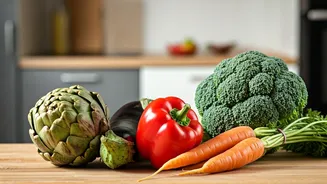Understanding Fatty Liver
Fatty liver disease, a condition marked by excessive fat accumulation in the liver, often goes unnoticed in its early stages. There are two primary types:
non-alcoholic fatty liver disease (NAFLD) and alcoholic fatty liver disease (AFLD). NAFLD is linked to lifestyle factors like obesity, diabetes, and poor diet, while AFLD is caused by excessive alcohol consumption. Symptoms may include fatigue, abdominal discomfort, and, in severe cases, liver damage, such as cirrhosis. Diagnosing this condition usually involves blood tests, imaging scans like ultrasound or MRI, and sometimes a liver biopsy. Dietary changes play a pivotal role in managing this condition, which can either prevent the condition or potentially reverse it. It is therefore crucial to identify and adopt a healthy eating pattern that incorporates beneficial foods, such as the vegetables discussed in the following sections.
Leafy Green Powerhouses
Leafy greens like spinach and kale are packed with antioxidants and nutrients essential for liver health. These vegetables are rich in compounds that reduce inflammation, a critical factor in fatty liver disease. Including these greens in daily meals helps protect the liver from damage. Spinach, readily available, can be incorporated into salads, smoothies, or sautéed as a side dish. Kale, known for its robust texture, is great in salads, soups, or even baked into chips for a healthy snack. Their high fiber content also aids in weight management, which is beneficial since obesity is often linked to NAFLD. Moreover, these vegetables support detoxification processes, ensuring the liver functions efficiently. By prioritizing leafy greens, individuals can adopt a proactive approach to supporting liver wellness.
Cruciferous Vegetable Benefits
Cruciferous vegetables such as broccoli, cauliflower, and Brussels sprouts are your allies in the battle against fatty liver. These vegetables contain compounds like glucosinolates, which support the liver's detoxification processes, helping eliminate harmful substances. Broccoli, in particular, has been shown to reduce liver fat accumulation, making it a valuable addition to your diet. Cauliflower is another versatile option; it can be used in various dishes, including mashed cauliflower as a low-carb alternative to mashed potatoes. Brussels sprouts, often roasted or steamed, offer a unique flavor and are full of liver-supporting nutrients. These cruciferous vegetables are easy to incorporate into meals. Roasting them brings out their natural sweetness, making them an excellent side dish. By eating these vegetables frequently, you will be giving the liver the boost it needs to function well.
The Advantage of Garlic
Garlic, a common ingredient in many Indian dishes, is another powerful vegetable for combating fatty liver disease. Garlic contains allicin, a compound with potent antioxidant and anti-inflammatory properties, providing support in reducing liver fat and improving liver function. Studies have shown that regular consumption of garlic can help lower liver enzyme levels, indicating improved liver health. Garlic can be easily incorporated into your diet, whether you are using it in your curries, soups, or stir-fries. Adding garlic to your cooking enhances the flavor of your food. For maximum benefit, you can crush or mince fresh garlic to release its beneficial compounds before cooking. Garlic is also very effective at promoting overall health, so consuming it regularly will have lasting positive effects on the liver.
Root Vegetables' Role
Root vegetables like carrots and beets offer a wealth of nutrients that can significantly benefit those with fatty liver disease. Carrots are rich in beta-carotene, an antioxidant that helps protect liver cells from damage. Beets, with their vibrant color, contain betaine, a compound known to improve liver function and reduce inflammation. These vegetables are versatile and easy to prepare. Carrots can be eaten raw, added to salads, or cooked in stews and stir-fries. Beets can be roasted, boiled, or even juiced, making them a great addition to your diet. The fiber content in root vegetables also aids in digestion, which is important for overall health. Incorporating these root vegetables into your regular meals will boost liver health and enhance overall health.



















